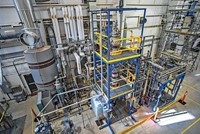Advertisement
Grab your lab coat. Let's get started
Welcome!
Welcome!
Create an account below to get 6 C&EN articles per month, receive newsletters and more - all free.
It seems this is your first time logging in online. Please enter the following information to continue.
As an ACS member you automatically get access to this site. All we need is few more details to create your reading experience.
Not you? Sign in with a different account.
Not you? Sign in with a different account.
ERROR 1
ERROR 1
ERROR 2
ERROR 2
ERROR 2
ERROR 2
ERROR 2
Password and Confirm password must match.
If you have an ACS member number, please enter it here so we can link this account to your membership. (optional)
ERROR 2
ACS values your privacy. By submitting your information, you are gaining access to C&EN and subscribing to our weekly newsletter. We use the information you provide to make your reading experience better, and we will never sell your data to third party members.
Environment
MIT coal study urges co2-control demos
March 19, 2007
| A version of this story appeared in
Volume 85, Issue 12
Capturing carbon dioxide and sequestering it underground is essential to allowing continued use of coal to meet the world's energy needs, says a new report by a group of Massachusetts Institute of Technology professors. However, the cochairs of the group, John Deutch and Ernest J. Moniz, warn that the U.S. must move much faster on conducting real-world, commercial-scale demonstration projects to capture and inject CO2 underground. They note that no commercial-scale U.S. coal power plant that captures CO2 is operating today nor is there any injection system placing CO2 in deep saline formations, the most promising geologic injection location. The report is particularly critical of Department of Energy R&D coal programs for being too slow and underfunded. Moniz said an investment of $800 million a year for capture and sequestration would fill the bill. The report also says a regulatory system that has both public and political support is needed to move capture and sequestration technologies along. It states that pricing of CO2 emissions is necessary to provide a financial incentive to encourage capture and sequestration technologies as well as to spur development and funding for new cleaner coal and renewable power systems. Deutch and Moniz also note that U.S. leadership in this area will be required to encourage capture and sequestration projects in China and India, which have no incentive to fund new carbon-limiting technologies as they rush to develop their economies and provide basic needs to their people.




Join the conversation
Contact the reporter
Submit a Letter to the Editor for publication
Engage with us on Twitter